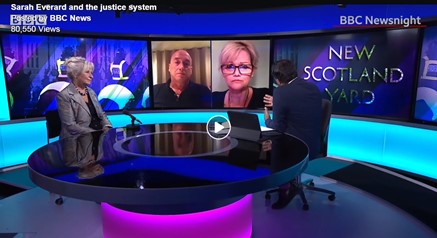
©Copyright Legal Women Limited 2025



Legal Women c/o Benham Publishing Limited, Aintree Building, Aintree Way, Aintree Business Park Liverpool, Merseyside L9 5AQ
In the news December 2021
Have you been following? The loss of confidence women are voicing in relation to the ability or willingness of the palaces of justice and corridors of power to protect them from misogynistic crime? In a Newsnight interview Baroness Helena Kennedy QC, Forensic Criminologist Jane Monckton- Smith, and former head of National Counter Terrorism Security Officer, Chris Phillips, discuss the Sarah Everard case and the criminal justice service, with different emphases.
Photo Credit 1: BBC Newsnight: https://www.facebook.com/bbcnews/videos/3028217964099606
Helena Kennedy states that the Sarah Everard case highlights an issue that is about more than misogynistic crime, “women now think the justice system is not working for them.... there’s a real loss of confidence. Chris Phillips places emphasis on an instance of the ‘bad apple’ in relation to Cousins, the police officer who raped and murdered Sarah Everard. Cousins, he argues, is not representative of the police force, and cites the finite resources that the police force has had to manage after searing cuts, “This is a societal issue.....you can’t focus just on the police”. Jane Monckton- Smith responds that the ‘bad apple’ alibi serves as a way of justifying the “widespread violence against women and girls”. She notes that Cousins’ misogynistic conduct was known to colleagues, that he thrived in the police force, emphasising the perspective of ‘institutionalised sexism’.
In the news November 2021
Have you been following? A panorama investigation Online abuse: Why do you hate me?, which looks into how women are receiving more and more hate crime and shows how toxic social media can prove to be for women. The programme seeks to hold the big tech platforms Facebook, Instagram, twitter, TikTok, you tube to account for allowing anti-women content. One survey claims that 97% of accounts reported to Twitter and Instagram for targeting women with hate crime, are not taken down. Social media companies say in the investigation they take action to stop hate crime, but their use of algorithms according to one researcher, “to send content that is curated and targeted at women” renders a loss of confidence in their claims. The programme reports that the advertising revenue of such platforms, works out at 31 dollars per user, and the longer people stay on the platform the more the company makes. “They are driving up their bottom line by keeping people’s interest in horrible, violent and often misogynistic content” notes one researcher, “Things are going backwards and we should not stand for it” says Ruth Davidson, former leader of the Scottish Conservative Party.
Despite the significant increase in reporting online hate, this does not end in prosecutions even where online harm spills over into real world instances of stalking and other offline harm. The programme begs the question as to whether the ‘slow response’ to reported misconduct is itself a kind of complacency in relation to the sexual harassment of women? “An allegation of misconduct is not necessarily a sexual offence”. The programme cites an Independent Office of Police Investigation report on Sexual Misconduct against Police officers in the last 5 years. 2,702 allegations have been made. Of these, 204 (8%) officers have been dismissed; 210 (8%) officers have been reprimanded; 93 (3%) ended up in the criminal court. The prosecution rate for sexual offence in England and Wales is 3.2%.
Panorama is broadcast as judgement (3 November 2021) on two police officers DC Deniz Jaffer and Jamie Lewis. In June 2020, the two officers took and disseminated denigratory photographs of the murdered sisters Bibaa Henry and Nicole Smallman. The judge warned them that they are to expect a lengthy custodial sentence.
On 21st October, news outlets and social media platforms all over the country reported the Girls Night In boycott by girls and women, as ‘sending a message to club and bar owners’ on the instances of spiking and suspected injection of women. Says Alex Mills, a student of Nottingham Trent University, “we’re serious we want change we want to feel safe on night’s out again”.
In the News October 2021
Have you been following? On 21st October, news outlets and social media platforms all over the country reported the Girls Night In boycott by girls and women, as ‘sending a message to club and bar owners’ on the instances of spiking and suspected injection of women. Says Alex Mills, a student of Nottingham Trent University, “we’re serious we want change we want to feel safe on night’s out again”.2 Girls and women protest at a demonstration (below) with banners claiming we will “not be silenced” a stance reminiscent of that taken in 1977 on Reclaim the Streets demonstrations.
Photo credit 2
Girls and women protest at a demonstration (below) with banners claiming we will “not be silenced” a stance reminiscent of that taken in 1977 on Reclaim the Streets demonstrations.

Footnotes:
Photo Credit 2:
Panorama - https://www.bbc.co.uk/iplayer/episode/m0010s0w/panorama-online-abuse-why-do-you-hate-me
The Penny University - https://ayewellhmm.wordpress.com/2020/11/12/remembering-reclaim-the-night-1977/
The juxtaposition of these two moments is a framing of the way history repeats herself, albeit in different forms, in relation to the issue of misogyny.
Photo Credit 2
Newsnight: https://www.facebook.com/bbcnews/videos/3028217964099606/)
Student Alex Mills: https://www.facebook.com/bbcnews/videos/the-boycott-is-to-send-a-message-were-serious-we-want-change/270455281658243/
